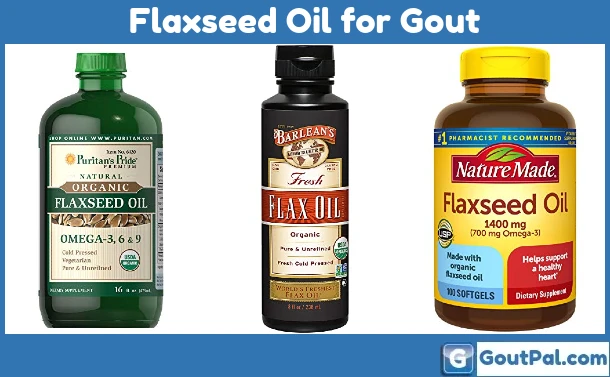Flaxseed Oil and Gout
Which oily foods can help gout? Read flaxseed oil and gout facts.

Flaxseed Oil and Gout Introduction
Is flaxseed oil good or bad for gout? First, you need to view flaxseed oil in the context of acceptable oils consumption. Then see how known scientific facts apply to your circumstances.Flaxseed Oil and Gout Purpose
Gout sufferers want to resolve concerns about flaxseed oil for different reasons. So I publish explanations that:Flaxseed Oil and Gout
For your eating pattern, flaxseed oil is part of the oils food group. So consult your national dietary guidelines or health professional to determine your daily or weekly consumption of oils. Then, consider scientific facts about flaxseed oil and gout. But be aware that there is very little validated research about the effects of flaxseed oil on gout sufferers. Which is why professional gout guidelines do not recommend flaxseed oil as a primary treatment.Flaxseed Oil and Gout Science
Flaxseed Oil Health Benefits
First, I reviewed a study about flaxseed oil fighting bacteria. Because its background information describes health benefits that include gout. Note that flaxseed oil is also known as linseed oil:Linum usitatissimum seeds have been used in the traditional Austrian medicine internally (directly soaked or as tea) and externally (as compresses or oil extracts) for treatment of disorders of the respiratory tract, eyes, infections, cold, flu, fever, rheumatism and gout. [...] Finally, it was concluded that linseed oil was individually a good antimicrobial agent and also confirms its potency to synergize the antimicrobial effects when analyzed in combination with gemifloxacin. [1]
But note that gemifloxacin (an antibacterial agent used in the treatment of chronic bronchitis and pneumonia) is known to increase uric acid, leading to gout in rats[2]. So, gout sufferers should only take gemifloxacin when advised by a gout-aware physician who can manage their complete treatment package.
Anti-inflammatory Flaxseed Oil and Gout
My next study expands on the general health benefits. As it looks at anti-inflammatory effects of flaxseed oil. But it isn't a gout study. Though, it mentions gout alongside other health benefits:Flaxseed oil reduces blood pressure and decreases the risk of stroke through a reduction in total cholesterol and LDL cholesterol and elevation of high-density lipoprotein. Also, due to its significant antiinflammatory effects it has been found useful in gout and lupus. [3]
Xanthine Oxidase Inhibitory Flaxseed Oil
Finally, a recent study show that flaxseed oil acts as a weak alternative to allopurinol in the lab. That means that it has potential to slow the production of uric acid. But it needs to be tested on gout sufferers before these lab results are meaningful in real life:The results demonstrated that the inhibitory potential of Flaxseed oil on xanthine oxidase is in a concentration dependent manner. However the inhibitory activity was lower when compared to the standard drug allopurinol. […] The advantage of Flaxseed oil over Allopurinol is the minimal amount of side effects or even null side effects since it is a natural product. The study revealed the potent xanthine oxidase inhibitory activity of flaxseed oil. Further detailed investigations are needed to develop it as an alternative medicine for the treatment of Gout. [4]
Flaxseed Oil and Gout Summary
So far, I have not found any studies that show effects of flaxseed oil on human gout sufferers. But there are indications that it might act as both an antiinflammatory and as an inhibitor of uric acid production. So you should discuss these facts with your professional health advisers.
Flaxseed Oil and Your Gout
You can see that flaxseed oil has not been studied for gout in-depth. So you can discuss this related research with your health professionals. Then work out how much flaxseed oil you will consume. But first, you should be aware of the national recommendations for consumption of oils that applies to you. Because you need to ensure that changes to eating patterns do not give you an unhealthy weekly eating plan.Your next steps for flaxseed oil and your gout are:
- Determine total oils consumption.
- Review how flaxseed oil supports your primary treatment.
- Adjust your eating pattern to include your preferred portion of flaxseed oil.
If you still have concerns about flaxseed oil and gout, you should discuss those concerns with your professional health advisers. However, if you want help to prepare for that discussion, please see the feedback section below.
Leave Flaxseed Oil and Gout to browse the Gout and Uric Acid Blog. Or return to your GoutPal Foodies.
Flaxseed Oil and Gout Feedback
Please share your thoughts about this page. To discuss other gout concerns, use the feedback link for the most relevant page. But if you just want to chat with other gout sufferers about flaxseed oil and gout, use GoutPal's Gout Discussions.
If you are asking a question, it's best to:
- Search for that question in Google Gout Search Engine first.
- Choose the most relevant result.
- Refer to that result as you ask your question.
Flaxseed Oil and Gout References
- Joshi, Y., Garg, R. and Juyal, D., 2014. Evaluation of synergistic antimicrobial activity of Gemifloxacin with Linum usitatissimum seed oil. liver, 2(4).
- Roy, B., Sarkar, A.K., Sengupta, P., Dey, G., Das, A. and Pal, T.K., 2010. Twenty-eight days repeated oral dose toxicity study of gemifloxacin in Wistar albino rats. Regulatory Toxicology and Pharmacology, 58(2), pp.196-207.
- Rawal, G., Yadav, S. and Nagayach, S., 2015. Phytosterols and the health. Medico Research Chronicles, 2(3), pp.441-444.
- Saivarshine, S., Kavitha, S., Vishnupriya, V. and Gayathri, R., 2020. In Vitro Xanthine Oxidase Inhibitory Potential Of Flaxseed Oil. Plant Cell Biotechnology And Molecular Biology, pp.92-96.
